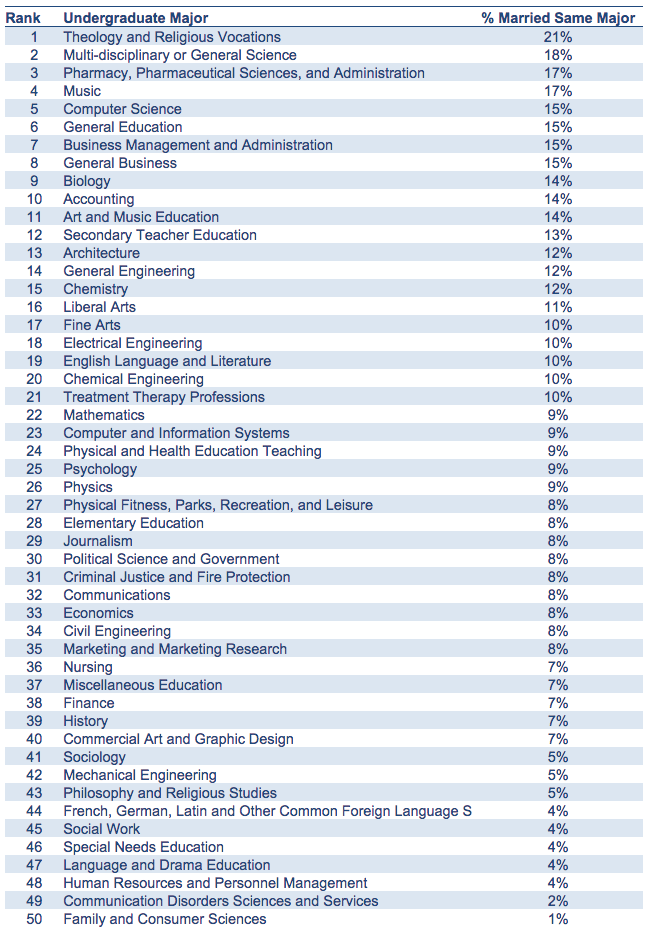Philosophy Majors Are Less Likely To Marry Each Other (updated)
Only 5% of “philosophy or religious studies” majors end up marrying other “philosophy or religious studies” majors, according to an analysis of census data by Dan Kopf at Priceonomics this past summer. This makes it one of the least common majors shared by married couples. Since, in the Census data, philosophy is lumped in with religious studies, we don’t know what the exact figure is just for philosophy majors. (Do you think it would be higher of lower?)
On the chart below, “philosophy and religious studies” is ranked 43rd out of 50.
When broken down by gender, the results are that 9% of women philosophy or religious studies majors marry others who share their major, while only 4% of men do. What explains this? Kopf writes:
The majors lowest on this list mostly appear there because they are heavily tilted towards one sex. For example, due to the paucity of men who study Family and Consumer Sciences, it’s tough for a heterosexual woman to find a match. But those few men in the field have a particularly good shot of finding love in their area of study. The same is true for other individuals who are the minority in a major that tilts heavily towards one sex.
Does anyone know if there is a similar study for PhDs?
(Via Samantha Brennan, who initially pointed to this Washington Post article about the study.)
UPDATE: As Tom Hurka and Jason Brennan note in the comments below, Kopf’s analysis does not take the total number of people who share a major into account. Jason writes: “philosophy and religious studies make up 0.7% of all college majors… Suppose college grads only marry each other. Suppose people were married other majors at random. Then, at base, you’d expect only about .49% of philosophy majors to marry each other. We’re getting an effect an order of magnitude above that. So, the chart actually says that philosophy majors are unusually likely to marry other philosophy majors.”



Maybe this has to do with philosophers not finding any importance or value in getting married in the first place?!
Sorry, couldn’t resist: https://fauxphilnews.wordpress.com/2012/02/22/psychologists-search-the-philosophical-mind-for-bullshit-detector-find-friendship-deterrence-system-instead/
Aren’t you more likely to marry someone in your major the more other people there are in your major, i.e. the more popular it is? Then your fellow-majors are a larger percentage of the total pool of potential spouses. And philosophy isn’t that popular a major.
What Tom said.
According to this website, philosophy and religious studies make up 0.7% of all college majors.
https://theamericanscholar.org/the-decline-of-the-english-department/#.VgF-LLSd7zI
Suppose college grads only marry each other. Suppose people were married other majors at random. Then, at base, you’d expect only about .49% of philosophy majors to marry each other. We’re getting an effect an order of magnitude above that.
So, the chart actually says that philosophy majors are unusually likely to marry other philosophy majors.
Well, this doesn’t establish that philosophy majors are unusually likely to marry each other; the same effect probably holds in other majors.
For one thing, we shouldn’t be squaring; the squared number is the chance that any given marriage is between two philosophy majors. But the number we’re interested in is the chance, given that X is a philosophy major, that X’s spouse is also. By random chance, that’d just be the straight-up percentage of majors. (Also, 0.7% squared is 0.0049%.)
And I think that if we look at other majors we’d find that the %married in majors is also higher than the %total majors. The question is whether the ratio is unusually high or low for philosophy.
The gender tilt hypothesis can’t be the only explanation. Only 9% of philosophy women marry a philosophy man, which is just middle of the road.
I find it amusing that this is being posted on my wedding anniversary, and yeah, I married a philosopher!
I married both a non-philosopher and a philosopher (not simultaneously. There are laws, I’m told.) I can’t speak to other’s experiences, but I can recognise both benefits and drawbacks of both. Somehow I managed to get the benefits of being married to a philosopher without the drawback the second time around. This is probably only because she’s smarter than I am.
Well, this is nice to hear. I’d like to believe that the philosophical skill makes one behave, everything else being equal, a little bit more reasonably than the average person. But I often find myself doubting that this hopeful belief is true.
It is of course self-evident that it is, everything else being equal, more reasonable not to marry a philosopher, so I take it as a good sign that most philosophers–despite convenience and bias that might incentivize to the contrary–are also to do the reasonable thing and not marry philosophers.
Good job, philosophers!
As the saying goes, first comes love, then comes marriage. I imagine many philosophical couples never get to the second for want of an account of the first 😛
This is also another case of “…and religious studies” being added to “philosophy.” We know that hurts philosophy on the income level data. Does it also pull down philosophy’s percentages here.
Which great philosopher, so far, has been married? Heraclitus, Plato, Descartes, Spinoza, Leibniz, Kant, Schopenhauer — were not; indeed it is impossible to even think about them as married. A married philosopher belongs to comedy, that it my proposition: and that exception, Socrates, the mischievous Socrates, appears to have married ironice, simply in order to demonstrate this proposition.
-Nietzsche, Third Essay of the Geneology
I think that if we make the assumptions Jason has made, the chances of a philosophy major being married to another philosophy major is 0.7%, not 0.49%.
I was momentarily flummoxed into thinking that 0.49% was the chance of a randomly chosen graduate being a philosophy graduate married to another philosophy graduate, but even that’s not right: that chance is 0.0049%.
That’s right. My bad.